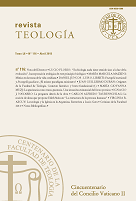Theology and Church in Argentina. Interview to Lucio Gera
Keywords:
Lucio Gera, Reception of Vatican II, Church and Argentine TheologyAbstract
The renewal of theology in Argentine started at least ten years before the Vatican II, although the latter certainly oriented and deepened the pastoral concerns present among priests of the Young Catholic Workers movement, and later in other poverty- related groups. The early post-council brought up questions about the reception and implementation of the Council in this country; it led to the creation of the Episcopal Commission for the Pastoral and saw the emergence of the Movement of Priests for the Third World. Vatican II challenged the bishops to think the adaptation of Medellín in our context, leading to the Document of San Miguel (1969). In these intense years, which were interrupted by the military coup of 1976 through 1983, “the Argentine school of theology” developed an original line of thought, a tradition that shaped the pastoral care and the academic theology. The new stage, starting with the return to democracy, completed the first phase of reception through the theological contribution of the Document Pastoral Lines for the New Evangelization (1990). Lucio Geras interview on March 12, 1999 shows him as one of the main contributors to the reception of Vatican II and its pastoral aim in our country.
Downloads
Downloads
Published
How to Cite
Issue
Section
License
Copyright (c) 2018 Teología

This work is licensed under a Creative Commons Attribution-NonCommercial-ShareAlike 4.0 International License.














 Teología
Teología